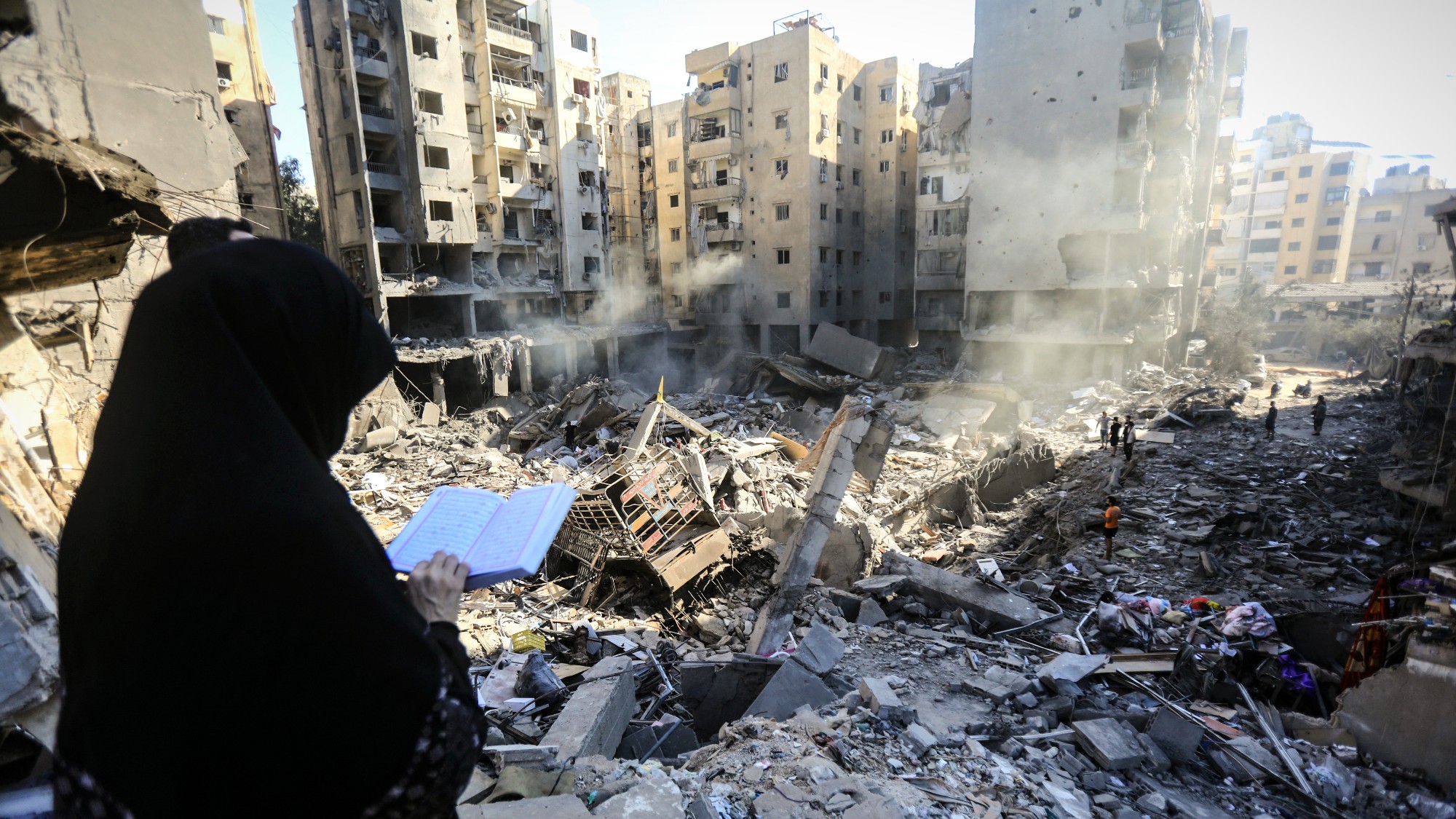Israeli killing of Hezbollah leader roils Lebanon, Iran
Israeli airstrikes killed Hassan Nasrallah and other top leaders of the militant group, escalating the chance of all-out war


A free daily email with the biggest news stories of the day – and the best features from TheWeek.com
You are now subscribed
Your newsletter sign-up was successful
What happened
On Sunday Israel attacked Hezbollah in Lebanon, Houthis in Yemen and Hamas in Gaza, hitting the three Iran-backed proxies as it amassed troops along its northern border for a possible ground invasion of Lebanon. Israeli airstrikes in Lebanon over the weekend killed longtime Hezbollah leader Hassan Nasrallah and other top leaders of the militant group. Two weeks of Israeli attacks have killed more than 1,000 people in Lebanon, displaced up to a million others and nudged the region toward all-out war.
Who said what
Nasrallah's death is "major blow to Iran," weakening Tehran's "best armed and most well-equipped ally in the region," Reuters said. In a show of "nervousness by the Iranian authorities," Supreme Leader Ayatollah Ali Khamenei has been "taken to a secure location." The crumbling of Hezbollah has opened "fissures" in Iran's government, The New York Times said. Significantly, Khamenei "signaled that it would be Hezbollah, not Iran," that struck back, suggesting he's choosing "lying low in the interest of self-preservation" over "all-out war with Israel."
Israel didn't just kill Nasrallah and his senior leadership team, it also "eviscerated decades of myths and assumptions about Hezbollah's military might" and its stature as a "regional powerhouse," The Washington Post said. Hezbollah "appears to have gravely overestimated its own strength and underestimated Israel's willingness to take it on" and the "extent to which Israeli intelligence had penetrated the organization."
What next?
Hezbollah may have "become a victim of its own hubris," The Wall Street Journal said, but "Israel now risks falling into a similar trap, especially if it launches a ground invasion of Lebanon," where Hezbollah "retains thousands of battle-hardened fighters and a large arsenal." Hezbollah is expected to pick Hashem Safieddine, head of its executive council and Nasrallah's cousin, as its new leader.
The Week
Escape your echo chamber. Get the facts behind the news, plus analysis from multiple perspectives.

Sign up for The Week's Free Newsletters
From our morning news briefing to a weekly Good News Newsletter, get the best of The Week delivered directly to your inbox.
From our morning news briefing to a weekly Good News Newsletter, get the best of The Week delivered directly to your inbox.
A free daily email with the biggest news stories of the day – and the best features from TheWeek.com
Peter has worked as a news and culture writer and editor at The Week since the site's launch in 2008. He covers politics, world affairs, religion and cultural currents. His journalism career began as a copy editor at a financial newswire and has included editorial positions at The New York Times Magazine, Facts on File, and Oregon State University.
-
 How the FCC’s ‘equal time’ rule works
How the FCC’s ‘equal time’ rule worksIn the Spotlight The law is at the heart of the Colbert-CBS conflict
-
 What is the endgame in the DHS shutdown?
What is the endgame in the DHS shutdown?Today’s Big Question Democrats want to rein in ICE’s immigration crackdown
-
 ‘Poor time management isn’t just an inconvenience’
‘Poor time management isn’t just an inconvenience’Instant Opinion Opinion, comment and editorials of the day
-
 Witkoff and Kushner tackle Ukraine, Iran in Geneva
Witkoff and Kushner tackle Ukraine, Iran in GenevaSpeed Read Steve Witkoff and Jared Kushner held negotiations aimed at securing a nuclear deal with Iran and an end to Russia’s war in Ukraine
-
 ‘The mark’s significance is psychological, if that’
‘The mark’s significance is psychological, if that’Instant Opinion Opinion, comment and editorials of the day
-
 ‘Bad Bunny’s music feels inclusive and exclusive at the same time’
‘Bad Bunny’s music feels inclusive and exclusive at the same time’Instant Opinion Opinion, comment and editorials of the day
-
 Trump links funding to name on Penn Station
Trump links funding to name on Penn StationSpeed Read Trump “can restart the funding with a snap of his fingers,” a Schumer insider said
-
 Trump reclassifies 50,000 federal jobs to ease firings
Trump reclassifies 50,000 federal jobs to ease firingsSpeed Read The rule strips longstanding job protections from federal workers
-
 Supreme Court upholds California gerrymander
Supreme Court upholds California gerrymanderSpeed Read The emergency docket order had no dissents from the court
-
 700 ICE agents exit Twin Cities amid legal chaos
700 ICE agents exit Twin Cities amid legal chaosSpeed Read More than 2,000 agents remain in the region
-
 Trump demands $1B from Harvard, deepening feud
Trump demands $1B from Harvard, deepening feudSpeed Read Trump has continually gone after the university during his second term
